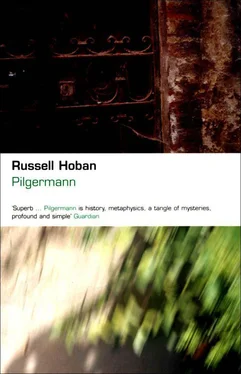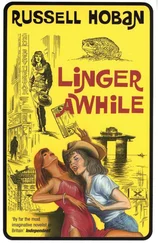Russell Hoban - Pilgermann
Здесь есть возможность читать онлайн «Russell Hoban - Pilgermann» весь текст электронной книги совершенно бесплатно (целиком полную версию без сокращений). В некоторых случаях можно слушать аудио, скачать через торрент в формате fb2 и присутствует краткое содержание. Год выпуска: 2002, Издательство: Bloomsbury Publishing PLC, Жанр: Современная проза, на английском языке. Описание произведения, (предисловие) а так же отзывы посетителей доступны на портале библиотеки ЛибКат.
- Название:Pilgermann
- Автор:
- Издательство:Bloomsbury Publishing PLC
- Жанр:
- Год:2002
- ISBN:нет данных
- Рейтинг книги:5 / 5. Голосов: 1
-
Избранное:Добавить в избранное
- Отзывы:
-
Ваша оценка:
- 100
- 1
- 2
- 3
- 4
- 5
Pilgermann: краткое содержание, описание и аннотация
Предлагаем к чтению аннотацию, описание, краткое содержание или предисловие (зависит от того, что написал сам автор книги «Pilgermann»). Если вы не нашли необходимую информацию о книге — напишите в комментариях, мы постараемся отыскать её.
Pilgermann — читать онлайн бесплатно полную книгу (весь текст) целиком
Ниже представлен текст книги, разбитый по страницам. Система сохранения места последней прочитанной страницы, позволяет с удобством читать онлайн бесплатно книгу «Pilgermann», без необходимости каждый раз заново искать на чём Вы остановились. Поставьте закладку, и сможете в любой момент перейти на страницу, на которой закончили чтение.
Интервал:
Закладка:
Here they are then, the conquerors of Antioch held back from the conquering of it; it is like holding back the bull from the cow: he paws the earth, he rolls his eyes, his breath steams on the air. All that makes him a bull is hot and ready. But the cow is a cow of stone.
What is the nature of things? The nature of things is that what can happen will happen, often it has already happened before it is recognized. The walls of Antioch were built during the reign of Justinian, a time of strong stonemasonry; those walls are not be knocked down or undermined, and any attacker who scales them will only find himself on a short stretch of rampart between the massive towers with a bitter rain of arrows hissing down and the strong doors of the towers barred against him. How then can the Franks breach the unbreachable, pass the impassable? How can Antioch be taken? It can be taken if someone on the wall will turn away from his duty, it can be taken if someone will open the strong tower doors and let the soldiers of Christ in quietly. And will someone be found to do this? What a question! Such a question can only be asked by an atheist; anyone who recognizes the existence of God (whether as He or as It) and the intersections of virtuality and actuality is well aware of how easily such crossings on the plane of possibility can be sucked up into a point of happening. After the event one looks at all the many lines converging on the point and marvels because it seems that people were born, nations assembled, geography organized, roads laid out and bridges built expressly so that this event could happen. So rise now to a point of happening the turningness of Firouz and the unturningness of Bohemond, the one on what is called the inside and the other on what is called the outside of the walls of the four hundred towers, those stones that have no enemy.
At this time that I am telling of I have so far seen Bohemond only at a considerable distance. There is of course no mistaking him, he is so astonishingly tall, taller than most men by half an arm’s length. When I see Bohemond, when I think of Bohemond, I know that I am seeing and thinking of more than Bohemond: as the arrow streaks to its target the point of the arrow is driven by the shaft behind it, the feathers that make the shaft fly true, and the bow that has loosed the energy of its bending into the flight of the arrow; so comes Bohemond from the loins of his father Robert Guiscard and the womb of his mother Alberada of Buonalbergo. But Bohemond’s lineage is more than human, it includes generations of horses; the line of Bohemond goes back to Eohippus, the dawn horse, the very beginning of all chivalry. And yet the most prepotent of Bohemond’s ancestors was neither a human nor an animal but an artifact: Bohemond is descended mainly from the stirrup. Bohemond is grown out of an aristocracy of warriors on horseback rising from the cavalry of Charles Martel; this aristocracy comes to the point of the present in the armoured man on the heavy horse with his feet firm in the stirrups that give power to the drive of his lance, the swing of his sword; the armoured man strong in the saddle, bred to fight and trained from boyhood to be unturning in attack; the armoured man superior in wealth, in breeding, in physique and in confidence to the man on foot.
Bohemond’s ancestors of the fifth century who fought under Chlodovech, they fought without armour and on foot, they hurled axes and barbed javelins, God knows what stocks and stones they offered to. What did they know of Jerusalem? How in the world has Bohemond come to be a soldier of Christ? How has Bohemond become the Bohemond who cut up his scarlet cloak into crosses? This is not to be known by me, I shall die without knowing it.
Bohemond is always in my mind but I have no chance of understanding him. When he was first pointed out to me I was high up on the wall looking down at his distant figure but in my thoughts he at once took his place high up as if striding on ramparts built for him alone. He is everything that I am not, this quintessential warrior prince. I am told that he can, fully armed, leap from the ground to his horse’s back; that no other man can wield with two hands the sword he wields with one; that he requires three women nightly to keep him tranquil; that he is a serpent in cunning, a thunderbolt in attack, he is simply not to be withstood. Red-haired and blue-eyed, he does what he wants and he gets what he wants. How should I not be obsessed with Bohemond? But his thoughts are beyond my imagination. In my drift through this space called time I have reported two dreams of Pope Urban II and I know that, whether virtually or actually, they are true. They are there, I have experienced them. But of Bohemond I can offer nothing sure, only intimations, only things half-sensed, half guessed-at. As the animals of the forest scent the questing hound I scent him, questing through the death of Christ and God’s departure, questing on the track of gold and fame and power, questing for the tangible, the visible, questing for that which cannot be mistaken, that which can be held in the strong hand, that which can be gripped between strong thighs as a horse is gripped.
So. Bohemond is encamped before the walls of Antioch and now we are in the year 1098. Bohemond, greedy and lusting for the seen, cannot yet have what he craves; that time is not yet come. As I say this there comes into my mind an image of Bohemond opposed by Bembel Rudzuk; it is a night image, the background of it is darkness; against the darkness the two figures are luminous, they leap out of the dark, stopped in mid-motion as if by lightning — Bohemond with the gleam of his helmet, the glitter of his mail, the flash of his great sword, the scarlet cross on his surcoat, the iron nasal and the straight brow-line of his helmet simplifying his face, the face of the death-angel haloed by the rainbow arc of the great sword. Bohemond the death-angel, Bohemond the questing death-hound circling in the night beyond the circle of Christ’s little wander-fire. Bohemond the tall, lit by the lightning as he leaps with his death-bringing, with his blood-drinking sword. And leaping at him with a flash of the gold brocade on his elegant scarlet jacket, with his Turkish sword heroic against the death-hound, with his moustaches heroic, Bembel Rudzuk the dauntless, Bembel Rudzuk who is at the same time like a lion of innocence, like an angel of folly, like a butterfly transfixed by the pin of actuality, Bembel Rudzuk the friend true unto death.
That is the image, held motionless against the dark as if by lightning, that comes into my mind as I think of the never-to-be-known, never-to-be-understood Bohemond. Simple greed, simple ambition, simple unlimited courage do not suffice to explain this man. Nothing I have so far said explains Bohemond. As one who is not a mathematical genius cannot understand one who is, so I cannot understand this genius of maleness and action; even simply counting up his attributes and his actions one arrives at something that cannot be accounted for: the total of the seen becomes the unseen, becomes a mystery. Bohemond has in the mystery of him such force as to make him a kind of un-Christ; in the greatness of his courage and his greed he looms gigantic; almost Death stands aside at the sound of his name and his great bones stand up shouting. His tomb in Apulia is domed, it has Romanesque arches, it has bronze doors. Sometimes as Pilgermann the owl I sit on the dome of Bohemond’s tomb in the twilight when it is still warm from the last sun of the day.
But it is the year 1098 that I tell of now; the bones of Bohemond are still in active partnership with his flesh and I have not yet achieved owlhood. It is February, a Turkish army is again on its way to the relief of Antioch, and this time Rudwan of Aleppo is with them. The Frankish cavalry is much diminished now; they must have less than a thousand horses fit for war. I cannot help thinking of those battles in the Holy Scriptures in which God would diminish the armies of the children of Israel the better to show his power; I have come to believe that God, having departed, now wills that nothing should stand between the Franks and Jerusalem.
Читать дальшеИнтервал:
Закладка:
Похожие книги на «Pilgermann»
Представляем Вашему вниманию похожие книги на «Pilgermann» списком для выбора. Мы отобрали схожую по названию и смыслу литературу в надежде предоставить читателям больше вариантов отыскать новые, интересные, ещё непрочитанные произведения.
Обсуждение, отзывы о книге «Pilgermann» и просто собственные мнения читателей. Оставьте ваши комментарии, напишите, что Вы думаете о произведении, его смысле или главных героях. Укажите что конкретно понравилось, а что нет, и почему Вы так считаете.












